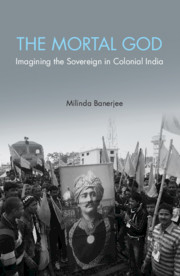Book contents
- Frontmatter
- Dedication
- Contents
- Acknowledgements
- Note on Transliteration
- Abbreviations
- Note on Documents Used
- Introduction
- 1 ‘Caesar of India’: Debating the British Monarchy and Colonial Rulership
- 2 ‘State is the Household Vastly Enlarged’: Imagining Sovereignty through the Princely States
- 3 ‘One Law, One Nation, One Throne’: Debating National Unity
- 4 ‘One has to Rule Oneself’: Collectivising Sovereignty in Peasant Politics
- 5 ‘God's Kingdom Has Come’: Messianic Sovereignty in Late Colonial India
- Conclusions and Further Thoughts
- Index
3 - ‘One Law, One Nation, One Throne’: Debating National Unity
Published online by Cambridge University Press: 13 September 2018
- Frontmatter
- Dedication
- Contents
- Acknowledgements
- Note on Transliteration
- Abbreviations
- Note on Documents Used
- Introduction
- 1 ‘Caesar of India’: Debating the British Monarchy and Colonial Rulership
- 2 ‘State is the Household Vastly Enlarged’: Imagining Sovereignty through the Princely States
- 3 ‘One Law, One Nation, One Throne’: Debating National Unity
- 4 ‘One has to Rule Oneself’: Collectivising Sovereignty in Peasant Politics
- 5 ‘God's Kingdom Has Come’: Messianic Sovereignty in Late Colonial India
- Conclusions and Further Thoughts
- Index
Summary
Introduction
This chapter argues that many Indian intellectuals and politicians imagined national sovereignty through concepts and ceremonies relating to singular rulership. Monarchy – the conceptual abstraction of ‘rule of one’ – became a privileged way of thinking about the unity of the nation as hinged on the nation's symbolic apex, a singular sovereign figure. In the last quarter of the nineteenth century and the first decade of the twentieth, such discussions were especially popular among Western-educated Indians in Bengal and Bombay Presidencies. Mythical and historical rulers were celebrated in public meetings, popular plays, novels, stories, songs, political essays and invented rituals. The royally-led unification of Germany and Italy in the 1860s and early 1870s and the ascendancy of Japan after the Russo-Japanese war of 1904–05 heightened the attraction of the national monarch among Indians. The British monarchy was a model which was both rejected and dialectically appropriated by Indians.
Indian nationalist elites voiced their desires for hegemonically governing the broader populace by invoking these sovereign figures: the imagined monarch encoded the self-image of the male nationalist politician as a guardian of the masses. Ronald Inden, who has written on Anglophone Indian nationalist historians, rightly suggests that the latter ‘transformed the divinity of the king into a sacred national unity’. When female rulers were invoked, the transgressive aspects of female sovereignty were sought to be domesticated by male intellectuals and publics (though not always successfully). Simultaneously, the monarch was projected as a saviour of the masses who fought against British and Indian elites. This fantasy of a protector-saviour-ruler emerged as part of critiques of colonial economic exploitation and bureaucratic administration and of the limitations of Indian elite politics. At the level of political metaphysics, it encoded a desire for the non-abstract, non-mediated, concrete, full presence of a certain form of embodied, allegedly visible, sovereignty.
Ironically India did not develop a real national monarchy. At this chapter's conceptual centre is an analysis of an attempted coronation which has never been foregrounded in academic scholarship, but which shows the limits of kingly discourses in practical instantiation. Surendranath Banerjea, then the most famous ‘Moderate’ Indian nationalist politician, attempted to have himself ‘anointed and crowned’ in 1906, at the peak of the anti-colonial Swadeshi movement. The ceremony failed to elicit broad-based support and was criticised by other Indian nationalist politicians and the British.
- Type
- Chapter
- Information
- The Mortal GodImagining the Sovereign in Colonial India, pp. 162 - 288Publisher: Cambridge University PressPrint publication year: 2017



